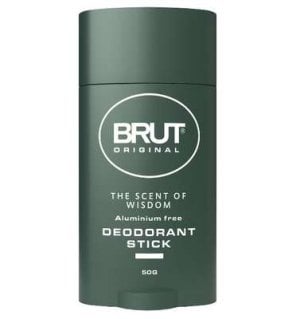Popular Woolworths product falls victim to shrinkflation: ‘That’s a massive increase’
By
Danielle F.
- Replies 18
In supermarket aisles, shoppers often go for their go-to essentials and pantry staples.
However, a familiar grooming product recently went through a drastic change that left shoppers feeling and smelling sour.
Woolworths is once again at the centre of attention due to shrinkflation.
The supermarket's Brut deodorant stick has downsized from a hefty 75 g stick to 50 g.
However, rather than paying less, shoppers ended up paying more, as the deodorant sticks saw a price increase from $7 to $10.
This means that the new unit cost is now $20 per 100g—over double the previous cost.
Newcastle resident and long-term Brut user Rachel King shared her frustration about the changes online.
'It has the same colour and style of packaging. Even though I buy it all the time, I just picked it up and went, "Oh yeah, it's back in stock",' Ms King said.
She only realised the price hike after doing her weekly shop.
'That's a massive increase because, in one go, they have doubled the price,' King lamented.
Woolworths immediately responded to the customer's concerns regarding Brut.
A spokesperson stated that the change was due to the supplier's new recommended retail price that followed the product's 'reformulation' last year.
Coles, Australia's other major supermarket chain, also carried the new Brut product on their shelves.
However, the $7 price tag remained.
'We assess any cost price increases on products to ensure they are justified,' a Coles spokesperson said as the supermarket highlighted its relationship with suppliers.
'This approach helps us carefully consider factors such as rising production costs and supply chain impacts, allowing us to balance the needs of our suppliers with the work we do to deliver value for our customers.'
PharmaCare, the parent company of Brut, cited post-pandemic manufacturing pressures as the reason for the change.
'We had to rebuild this capability in our business. This has been an extensive process to provide a product that reflects the one our consumers know and love,' PharmaCare stated.
'Unfortunately, this has come with an increase in cost to avoid discontinuation of the Brut deodorant stick from our range altogether.'
However, Brut is just one of the many products that went through shrinkflation.
Several pantry staples, household items, and even indulgences like sweets have been reduced in size while keeping prices the same or higher.
The issue became so prevalent that the consumer regulator noted the supermarkets' lack of transparency and accused them of price-gouging amid a cost-of-living crisis.
These findings led to calls for supermarkets to notify consumers about size changes.
While the practice already exists in France, Aussie shoppers have yet to see this rule implemented in supermarkets.

Has your favourite product gone through shrinkflation lately? Did you stick with it despite the changes, or did you find an alternative for it instead? Share your stories with us in the comments below!
However, a familiar grooming product recently went through a drastic change that left shoppers feeling and smelling sour.
Woolworths is once again at the centre of attention due to shrinkflation.
The supermarket's Brut deodorant stick has downsized from a hefty 75 g stick to 50 g.
However, rather than paying less, shoppers ended up paying more, as the deodorant sticks saw a price increase from $7 to $10.
This means that the new unit cost is now $20 per 100g—over double the previous cost.
Newcastle resident and long-term Brut user Rachel King shared her frustration about the changes online.
'It has the same colour and style of packaging. Even though I buy it all the time, I just picked it up and went, "Oh yeah, it's back in stock",' Ms King said.
She only realised the price hike after doing her weekly shop.
'That's a massive increase because, in one go, they have doubled the price,' King lamented.
Woolworths immediately responded to the customer's concerns regarding Brut.
A spokesperson stated that the change was due to the supplier's new recommended retail price that followed the product's 'reformulation' last year.
Coles, Australia's other major supermarket chain, also carried the new Brut product on their shelves.
However, the $7 price tag remained.
'We assess any cost price increases on products to ensure they are justified,' a Coles spokesperson said as the supermarket highlighted its relationship with suppliers.
'This approach helps us carefully consider factors such as rising production costs and supply chain impacts, allowing us to balance the needs of our suppliers with the work we do to deliver value for our customers.'
PharmaCare, the parent company of Brut, cited post-pandemic manufacturing pressures as the reason for the change.
'We had to rebuild this capability in our business. This has been an extensive process to provide a product that reflects the one our consumers know and love,' PharmaCare stated.
'Unfortunately, this has come with an increase in cost to avoid discontinuation of the Brut deodorant stick from our range altogether.'
However, Brut is just one of the many products that went through shrinkflation.
Several pantry staples, household items, and even indulgences like sweets have been reduced in size while keeping prices the same or higher.
The issue became so prevalent that the consumer regulator noted the supermarkets' lack of transparency and accused them of price-gouging amid a cost-of-living crisis.
These findings led to calls for supermarkets to notify consumers about size changes.
While the practice already exists in France, Aussie shoppers have yet to see this rule implemented in supermarkets.
Key Takeaways
- Woolworths started selling a smaller version of Brut deodorant at a higher price due to shrinkflation.
- There has been public criticism regarding the supermarket's price-gouging strategies during a cost-of-living crisis.
- PharmaCare, the owner of Brut, stated that post-pandemic manufacturing pressures brought about the size reduction and cost increase.
- Consumer advocates called for greater transparency in shrinkflation practices, suggesting that supermarkets should notify consumers about package size changes.







